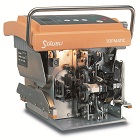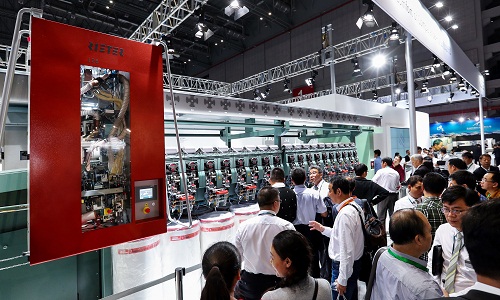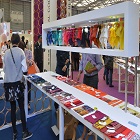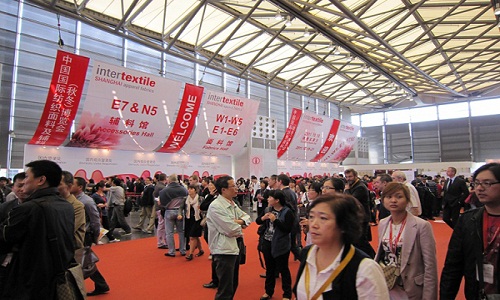FW

Stäubli’s booths at ITMA + CITME 2016 are not just about technology updates, it’s about the whole experience. Live demonstrations of challenging weaves and weaving preparation processes will vividly illustrate the extraordinary flexibility provided in terms of applications, automation, and services for weaving mills.
Stäubli drives worldwide Jacquard boost with adaptable machinery
In the Jacquard area at the booth, a refined DX Jacquard machine including harness will be shown at a special demonstration stand. This proven Jacquard machine has been redesigned for even longer service life and is being publicly unveiled at this show. Suitable for any standard Jacquard application, the DX can be used with the full range of Stäubli harness types. Stäubli harnesses are widely appreciated by weavers for their levelling features and their perfectly balanced high-quality components, delivering high performance and durability.

Stäubli will be showing the completely re-engineered electronic LX and LXL Jacquard machines for the first time in Asia. Producing a wide array of fabrics, these machines will demonstrate their exceptional precision and reliability in complete Jacquard installations. The extremely versatile LX Jacquard machines and LXL Jacquard machines are ideal for broad use in modern Jacquard weaving. These new series feature a new lifting mechanism that allows high-speed weaving of even extremely heavy fabrics. With the new coaxial drive shaft and re-sized chassis supporting beams and bearings, the new models can handle up to 26% greater loads than previous models. In addition, the positioning of the fans in the housing of the LX optimises internal airflow, thereby ensuring that the machine interior remains clean and at a controlled temperature. The LX models are available in sizes up to 6,144 hooks, whilst the LXL can achieve up to 36,864 hooks when two machines are combined.
Presenting the third generation of dobbies
Being presented to the public for the first time are the newly developed S3062/S3061 dobbies for water-jet applications. The evolutionary design of these machines now incorporates the exclusive Stäubli locking system for enhanced security and for selection of the heald frames. These technologies are being unveiled with the third generation of electronic rotary dobbies, previously available only for rapier and air-jet machines. The new S3062/S3061 dobbies are being launched in combination with the new generation of high-mounted transmissions, the de82 and de83, featuring perfectly balanced kinematics, reinforced structure, and an integrated controller. Weavers who invest in the high-performance combination of S3062/S3061 dobby and de82/83 transmission will profit from higher output as a result of higher running speeds and superior reliability. In addition, they can run their mill with less maintenance and lower energy consumption.
SAFIR S40 enhances efficiency
Efficient drawing-in of cotton warps is the speciality of the SAFIR S40 automatic drawing-in system. In a single cycle, it draws in directly from one warp beam into drop wires, healds, and reed. Featuring a mobile drawing-in machine, it supports continuous workflows and ensures reliability in terms of quality and quantity resulting in economical production of fabrics like denim, bed and table linens, or blouse and shirt fabrics, produced with a maximum of 12 heald frames. Visitors to the booth will be able to see their future workhorse demonstrating its efficiency while drawing in denim yarn (100% Co), Ne 12, open end.
TOPMATIC warp-tying machine
The well-proven TOPMATIC is also being demonstrated at the Stäubli booth. The model TOPMATIC 201 PC with integrated double-end detection – even for warps with no lease – will show its strengths tying a cotton warp without a 1:1 lease.
MAGMA T12 – automatic warp-tying for technical fibres
Ideal for mills supplying the growing market of technical textiles, the MAGMA T12 warp-tying machine ties medium-to-coarse yarn types, e.g. coarse multifilament, PP ribbons, bast fibres, coarse staple fibres, and many other fibre types. The machine is equipped with an optical system for double-end detection and has a patented yarn separation system, eliminating the need for specific separation needles. A touch-screen panel displays information about the tying process and is used by the operator to conveniently enter parameters and settings. The MAGMA T12 will be demonstrated at the Stäubli booth tying 0.4 mm nylon monofilament yarn.
DEIMO knitting solutions
Stäubli will be showing for the first time in Asia the D4S automatic toe-closing device for circular sock knitting machines. Visitors to the booth will see for themselves how the D4S drastically shortens the sock production process. The latest model in the DEIMO range of controllers, the type 2900 S, serves as an electronic controller for circular knitting machines. DEIMO is presenting its product range at a separate booth in the knitting area: D15 in Hall 4.
Experience Technology the Stäubli way at ITMA Asia 2016
<p>
Stäubli’s booths at ITMA + CITME 2016 are not just about technology updates, it’s about the whole experience. Live demonstrations of challenging weaves and weaving preparation processes will vividly illustrate the extraordinary flexibility provided in terms of applications, automation, and services for weaving mills. </p>
<p>
<h2> Stäubli drives worldwide Jacquard boost with adaptable machinery </h2>
<p>
In the Jacquard area at the booth, a refined DX Jacquard machine including harness will be shown at a special demonstration stand. This proven Jacquard machine has been redesigned for even longer service life and is being publicly unveiled at this show. Suitable for any standard Jacquard application, the DX can be used with the full range of Stäubli harness types. Stäubli harnesses are widely appreciated by weavers for their levelling features and their perfectly balanced high-quality components, delivering high performance and durability. </p>
<p>
Stäubli will be showing the completely re-engineered electronic LX and LXL Jacquard machines for the first time in Asia. Producing a wide array of fabrics, these machines will demonstrate their exceptional precision and reliability in complete Jacquard installations. The extremely versatile LX Jacquard machines and LXL Jacquard machines are ideal for broad use in modern Jacquard weaving. These new series feature a new lifting mechanism that allows high-speed weaving of even extremely heavy fabrics. With the new coaxial drive shaft and re-sized chassis supporting beams and bearings, the new models can handle up to 26% greater loads than previous models. In addition, the positioning of the fans in the housing of the LX optimises internal airflow, thereby ensuring that the machine interior remains clean and at a controlled temperature. The LX models are available in sizes up to 6,144 hooks, whilst the LXL can achieve up to 36,864 hooks when two machines are combined. </p>
<p>
<h2> Presenting the third generation of dobbies </h2>
<p>
Being presented to the public for the first time are the newly developed S3062/S3061 dobbies for water-jet applications. The evolutionary design of these machines now incorporates the exclusive Stäubli locking system for enhanced security and for selection of the heald frames. These technologies are being unveiled with the third generation of electronic rotary dobbies, previously available only for rapier and air-jet machines. The new S3062/S3061 dobbies are being launched in combination with the new generation of high-mounted transmissions, the de82 and de83, featuring perfectly balanced kinematics, reinforced structure, and an integrated controller. Weavers who invest in the high-performance combination of S3062/S3061 dobby and de82/83 transmission will profit from higher output as a result of higher running speeds and superior reliability. In addition, they can run their mill with less maintenance and lower energy consumption. </p>
<p>
<h2> SAFIR S40 enhances efficiency </h2>
<p>
Efficient drawing-in of cotton warps is the speciality of the SAFIR S40 automatic drawing-in system. In a single cycle, it draws in directly from one warp beam into drop wires, healds, and reed. Featuring a mobile drawing-in machine, it supports continuous workflows and ensures reliability in terms of quality and quantity resulting in economical production of fabrics like denim, bed and table linens, or blouse and shirt fabrics, produced with a maximum of 12 heald frames. Visitors to the booth will be able to see their future workhorse demonstrating its efficiency while drawing in denim yarn (100% Co), Ne 12, open end. </p>
<p>
<h2> TOPMATIC warp-tying machine </h2>
<p>
The well-proven TOPMATIC is also being demonstrated at the Stäubli booth. The model TOPMATIC 201 PC with integrated double-end detection – even for warps with no lease – will show its strengths tying a cotton warp without a 1:1 lease. </p>
<p>
<h2> MAGMA T12 – automatic warp-tying for technical fibres </h2>
<p>
Ideal for mills supplying the growing market of technical textiles, the MAGMA T12 warp-tying machine ties medium-to-coarse yarn types, e.g. coarse multifilament, PP ribbons, bast fibres, coarse staple fibres, and many other fibre types. The machine is equipped with an optical system for double-end detection and has a patented yarn separation system, eliminating the need for specific separation needles. A touch-screen panel displays information about the tying process and is used by the operator to conveniently enter parameters and settings. The MAGMA T12 will be demonstrated at the Stäubli booth tying 0.4 mm nylon monofilament yarn. </p>
<p>
<h2> DEIMO knitting solutions </h2>
<p>
Stäubli will be showing for the first time in Asia the D4S automatic toe-closing device for circular sock knitting machines. Visitors to the booth will see for themselves how the D4S drastically shortens the sock production process. The latest model in the DEIMO range of controllers, the type 2900 S, serves as an electronic controller for circular knitting machines. DEIMO is presenting its product range at a separate booth in the knitting area: D15 in Hall 4. </p>

Oerlikon Manmade Fibers segment showcased its Industrie 4.0 solutions true to the claim ‘The Future is Now’ at ITMA + CITME 2016. The Oerlikon Manmade Fiber segment comprises two brands – Oerlikon Barmag and Oerlikon Neumag. With its many years of expertise in complex production systems engineering, Oerlikon Barmag – which focusses on CP, POY, FDY, DTY, industrial yarn (IDY) as well as tape and monofilament products and services – alone will be presenting 12 new manmade fiber spinning solutions at the trade fair.

Oerlikon Barmag WINGS POY HD is designed for the requirements of high yarn titers of up to 500den polyester POY. Oerlikon Barmag WINGS FDY family offers the perfect, commercially-attractive solution – the high-end model WINGS FDY PLUS is shown at an ITMA Asia + CITME for the first time. Oerlikon Neumag is premiering its new multifunctional forming table for its meltblown systems with a considerably reduced footprint and a shortened wire length that reduce maintenance costs.
Betting big on China
The primary focus is on the innovative Oerlikon Manmade Fibers Industrie 4.0 system control and customer services solutions. With new features and offerings for the intelligent ‘POC – Plant Operation Center 4.0’ system control software, producers can now maintain a constant overview of all processes – from the polycondensation, spinning and texturing all the way through to downstream further processing procedures. This helps clients increase the productivity of their systems, save energy and deploy resources efficiently. Oerlikon already shows manufacturers how they can optimise the production processes of the future – ‘The Future is Now’.
Industrie 4.0 solutions blazing a trail
Using virtual reality presentation, augmented reality solutions with the recently-launched Microsoft HoloLens IT development for ‘predictive maintenance’ concepts and virtual 360-degree tours through spinning plants, visitors to the trade fair will be offered everything that state-of-the-art technology makes possible today. Linked to future-oriented service and automation solutions, Oerlikon wants to prepare its customers for the future of manmade fiber production. The fact that this will ultimately result in improved yarn quality goes without saying for the market leader, along with offering environmentally-compatible and sustainable production processes. Here, the segment will be presenting its e-save initiative for the 12th year in succession and showcasing new recycling solutions – ‘From shredded PET to value add’.
A new addition to the WINGS POY and FDY family
The WINGS POY family now has a further new member, now also including the WINGS POY HD available for processing high titers. With its expanded godet system, the new winder has been designed especially for the requirements of high yarn titers of up to 500den polyester POY. In conjunction with the EvoQuench radial quenching system, microfilament yarns with high titer ranges can now also be manufactured with outstanding properties
Combined with the eAFK texturing machine – also designed for high titers – Oerlikon Barmag therefore offers a total ‘From Melt to Draw Textured Yarn’ concept that produces polyester DTY with up to 450den in accustomed Oerlikon Barmag DTY quality
eAFK HQ – texturing in a new dimension
With the eAFK HQ, Oerlikon Barmag will be presenting the world’s most productive automatic texturing machine at the ITMA Asia + CITME. Furthermore, the new eAFK HQ simultaneously excels as a result of its extremely space-saving construction. With this, customers are able to texture their products in the tried-and-tested quality, assured by Oerlikon Barmag, on a machine with the smallest space requirements in the DTY market. At the same time, they benefit from the 50% increase in productivity offered by the eAFK HQ compared to other texturing machines supplied by competitors.
The eAFK HQ is designed with 12 sections, each with 48 positions. Compared to the eAFK machine – with more than 1,000 successful installations worldwide – a fourth level in the winding unit of the eAFK HQ increases the capacity of the machine to 576 positions – a world record! And all this with simultaneously considerably reduced energy consumption. The newly-developed compact block heater lowers energy costs by reducing the radiated heat loss. With the highest level of precision, the new ATT traverse system ensures excellent package build.
Industrial textiles becoming increasingly popular
For the industrial textiles growth market, Oerlikon Barmag will be unveiling its latest developments for the production of yarns used in airbags, safety belts and tire cord. Here, the focus will, above all, be on polyamide 6 and polyamide 6.6 solutions. However, the very latest process and machine solutions will also be unveiled for polyester applications – for low shrinkage and high tenacity yarns, among others.

The fully-automated, double-sided air-jet spinning machine with 200 spinning units, up to 6 robots and a delivery speed of 500 m/min ensures economical and flexible production. The recently showcased J 26 automated air-jet spinning machine at ITMA + CITME 2016 has striking advantages among other air-jet spinning machines. The P 26 polyester attachment ensures 100 % polyester spinning with long running intervals without manual cleaning. High performance is supported by the piecing preparation system with reduced piecing time. The winding unit ensures optimal package build-up and therefore higher package weight. Technological innovations and adapted settings enable to produce soft Com4®jet yarns.
Spinning 100 % polyester

With the new P 26 attachment 100 per cent polyester can be spun on J 26. The P 26 system applies liquid to the fibres in front of the twisting zone. This liquid creates benefit for reducing polyester deposits on the technology components, prolonging production times with stable yarn quality, higher yarn strength, lower yarn hairiness, etc. The P 26 system is connected to tap water which is filtered so that no sediments can enter the system. The integrated Rieter clearer Q 10A checks the yarn quality. Special clearing channels monitor the P 26 system at each spin unit.
Rieter Q 10A yarn clearer
With 15 years of experience and 1 million of sensors in operation, Rieter is launching a yarn clearer specially designed for air jet spinning. Special clearing channel detecting very fast yarn surfaces changes caused by spin nozzle blockages. The detection is within 10 m and the fault can be removed easily. Unlike any other yarn clearing sensor, Q 10A provides a direct digital output out of the measurement. This guarantees maximum exactness in detecting yarn fault size, e.g. small but long yarn count deviations. Q 10A supports and monitors with a special channel the proper function of the new polyester attachment. The Q 10A detects smallest yarn deviations caused by malfunction of the attachment. A specially designed spectrogram helps to set individual limits for warnings and alarms and provides reliable detection and data to analyse the cause of periodic faults.
Produce yarn economically
High productivity in combination with other cost-saving concepts provides the lowest yarn manufacturing costs and highest margins for applications. With the same available floor space, output of the J 26 machine is up to 108 per cent higher and production margins up to 128 per cent higher compared to other air-jet spinn
The Indian spinning industry is faced with weak demand from overseas markets and poor yarn demand from the domestic garment sector. Growth in domestic yarn consumption stood at the lowest in four years during financial year ’16 (0.8 per cent for cotton spun yarn and 2.5 per cent for total spun yarn), and spun yarn production remained flat in the April to June quarter of financial year ’17 on a year-on-year basis.
So spinners will need to sacrifice profitability to maintain capacity utilization. Apart from profitability pressures, high cotton prices will translate into higher working capital requirements and hence borrowings and will translate into weaker credit metrics.
While industry profitability is expected to come under pressure, some of the stronger players, who had stocked cotton prior to the increase in cotton prices, may witness improved profitability driven by inventory gains during the second quarter of financial year 2017. The area under cotton cultivation is expected to decline for the second consecutive year by 12 per cent in 2017, following a seven per cent decline in 2016. Even a recovery in yields is unlikely to lift production. This is despite the good monsoons and high cotton prices.
The Pakistani textile sector has urged the government to take pragmatic steps towards exploring non-traditional markets to increase exports. According to the Pakistan Textile Exporters Association (PTEA), the commerce ministry has said in a paper that this was indeed the time to focus on non-traditional markets as huge opportunities are available. These non-traditional markets include South Africa, Australia, New Zealand, Korea, Japan, Taiwan, Mexico, Chile, Peru, Argentina, Cuba and Canada, stated the paper.
The recommendation comes as Pakistan’s exports take a sharp dive with the current account data for September showing the deficit increasing 13 per cent. Meanwhile, textile comprises of over half of the country’s total exports.The Association also urged the government to activate Pakistan’s trade missions abroad and rationalise activities and policies of the Trade Development Authority of Pakistan (TDAP) towards this direction so that the objectives could be achieved.
The Association has also recommended that frequent exchange of trade delegations to emerging markets would help enhance trade opportunities and explore new space for dwindling exports. It also notes that billions of rupees from the Export Development Fund (EDF) were being wasted on unproductive tours of government officials.
Committed to change, Invista, one of the world’s largest integrated producers of fibres and polymers and owner of the LYCRA® brand, has unveiled its 2017-2018 global intimate apparel , swimwear and athleisure trends and fashion directions that reinforce brand innovations and value benefits.
Invista and its Amsterdam-based forecasting agency Stijlinstituut have predicted the must-have trends for 2017/18 which were brought to life through an inspirational LYCRA® capsule collection featuring cutting-edge trends and technologies. With long-standing expertise revolutionising women’s wardrobes, the brand remains at the forefront of intimate apparel and swimwear innovations by presenting forward-thinking creative directions. The four trends highlight the rise in health, fitness and mindfulness as a lifestyle with the engaging motto ‘I am Every Woman.’
Detailing the innovations, Claire O’Neill, Intimate Apparel & Swimwear Marketing Segment Manager at Invista said her company presents a great variety of trends for Intimate Apparel and Swimwear because wearers come in vast numbers each one with their own lifestyle and multifaceted personality, adapting to constantly changing environments. It is the versatility of Invista fibres that enables and facilitates these dynamics by offering flexible and performing wardrobes to suit every woman and her various wants. The addition of the Athleisure platform reflects an exciting opportunity for intimates and body wear brands to expand their business.
Invista fashion directions has become a recognised source of inspiration underpinned by sound technical innovation. It creates value for brands and retailers and supporting partner mills of Invista with valuable trend insights, innovation and new business opportunities.
High cotton prices, low consumption growth and weak export prospects entangle spinning industry. As per a research by ICRA, the independent and professional investment information and credit rating agency, cotton availability in the country is likely to remain tight in 2017 while prices would remain higher on a y-o-y basis during FY2017.
Historically, high cotton price has not benefited the cotton spinning industry as it impacts demand, reduces competitiveness, and increases risk of inventory losses besides resulting in need for higher funding requirements. Given the tight opening stock position and unlikely increase in cotton crop size, cotton export levels will determine the domestic cotton availability and prices in H1 FY18. The pressure on yarn exports and tepid domestic consumption remain a challenge for the Indian spinning industry.
During FY16, growth in domestic yarn consumption stood at the lowest in four years (0.8 per cent for cotton spun yarn and 2.5 per cent for total spun yarn) while the spun yarn production remained flat in Q1 FY17 a y-o-y basis. Given the lukewarm domestic consumption and weak prospects of textile exports, demand for yarn is unlikely to get any support. Thus, spinners will need to sacrifice profitability to maintain capacity utilisation.
Commenting on the financial health of Indian spinning industry, ICRA stated that apart from profitability pressures, high cotton prices will translate into higher working capital requirements and hence, borrowings and will translate into weaker credit metrics. ICRA cuts the outlook of Indian cotton spinning industry from stable to negative.
While profitability is expected to come under pressure, ICRA notes that some of the stronger players, who had stocked cotton prior to increase in cotton prices, may witness improved profitability driven by inventory gains during Q2 FY2017. This is definitely a negative sign, it is believed.
Made-ups and home textile segment in the country would be covered under the Rs 6,000-crores special package that was recently approved for the garment sector. Hinting this, Union Minister of Textiles Smriti Irani has said that her Ministry was actively considering extending the benefits of special package to made-ups and home textile segment which had been excluded from its ambit. The minister further said that an announcement for the same is likely to be made around Diwali. She said this in her address after presenting Texprocil Awards at Mumbai.
The made-ups and home textile segment is equally, if not more, labour intensive than the apparel sector and has the capability of generating sizeable new employment. At the same time, it will act as a pull factor for increased consumption of fibre, yarns and fabric produced domestically, she added. The minster appreciated the industry's efforts to remain leading exporter and assured all help to it.
Earlier, R K Dalmia, Chairman of The Cotton Textiles Export Promotion Council (Texprocil), said the special package of Rs 6,000 crore for the apparel sector was a step in the right direction given the current scenario of world trade and international competitiveness. The reimbursements of State and Central levies along with labour reforms will strengthen the textile sector by improving its cost competitiveness in the global market, he stated. Considering that textile is a low margin industry, introduction of such packages can lead to an exponential leap in export performance. This can be seen from the fact that in September this year, export of garments showed a 12 per cent increase amid a downward trend in most other sectors, he added.
Chinese garment manufacturer to open new factory in Arkansas Chinese garment manufacturer Suzhou Tianyuan Garments which supllies to Adidas, Reebok and Armani brands will shortly open a factory in Arkansas that would create as many as 400 jobs. The state has signed a MoU with the company regarding. The manufacturer will invest $20 million in its Arkansas location that would most likely be in Little Rock. The job workers would be paid an average wage of $14 per hour.
The state's deal with the company calls for a $1 million infrastructure assistance grant. This would be $500,000 that would be used for training purposes and an estimated $1.6 million in rebates based on the company's annual payroll.
"The recently concluded Intertextile Shanghai Apparel Fabrics-Autumn Edition 2016 received praises from participants and visitors alike on the quality and internationality of the fair’s 22nd edition. After years of consecutive growth in the number of exhibitors, the 2016 show concluded similar in size as last year.

The recently concluded Intertextile Shanghai Apparel Fabrics-Autumn Edition 2016 received praises from participants and visitors alike on the quality and internationality of the fair’s 22nd edition. After years of consecutive growth in the number of exhibitors, the 2016 show concluded similar in size as last year. The 4,553 exhibitors from 29 countries & regions (2015: 4,642, 29 countries & regions) at this year’s fair attracted over 73,000 buyers from 90 countries and regions (2015: 66,256, 97 countries and regions), a roughly 10 per cent increase and a number, which includes those registered for concurrent Yarn Expo Autumn, PH Value and CHIC fairs, and attended Intertextile Shanghai as well. The gross area of the fair grew slightly to 260,000 sq mt (2015: 228,000).

“For the last few years, even though Intertextile Shanghai has continued to grow in size, our priority has been to focus on the quality of exhibitors and buyers that participate here to ensure it remains the global industry’s leading business event every March and October,” says Wendy Wen, Senior General Manager of Messe Frankfurt (HK) said at the conclusion of the show. “While we are aware that the current economic conditions are creating challenges in some sectors of the industry, we are confident that with the unrivalled range, internationality and quality of exhibitors here, this fair is increasingly viewed as the leading event where quality trade buyers come to conduct business, regardless of the prevailing economic conditions.”
Exhibitors, visitors return satisfied
Both new and returning exhibitors reflected this sentiment, including Third Office from Japan, a first-time participant in the fair’s Beyond Denim area. “During the fair, we met many high-quality buyers,” John Xu from the company’s Fabric Department explained. “Our priority is not the quantity of the buyers but the quality, so Intertextile Shanghai is a very effective trade platform for this, and it’s definitely the most influential one in Asia.” Xu also touched on the fair’s global nature. “Being in the high-potential Chinese market, Intertextile Shanghai creates a lot of valuable new business opportunities that other fairs cannot. Apart from local buyers, we also had visitors from the buying offices of overseas brands and manufacturers, and even from an existing customer from Japan who placed an order on the spot!”
Long-term exhibitors and leading industry brands such as DuPont also use the fair as a platform to connect with the industry. “Intertextile has been an important platform for us in the Asia Pacific region for a number of years. As we expand more into wearable technology area, this will be the best place for us to reach out and to connect with the market,” said Gordon Tseng, AP Regional Business Development Manager, Wearable Segment, DuPont Photovoltaic & Advance Materials.
While exhibitors appreciated the diversity and quality of buyers to the fair, conversely these same buyers valued Intertextile Shanghai for the ability to find quality exhibitors covering the entire supply chain under one roof. “Every time we come to this fair, we find old suppliers we have had success with, and new vendors as well. The quality of these suppliers is what brings us back again and again,” commented Dustin Rhodes from Pro Look Sports, US. Italian buyer Salvatore Parasuco, President & Creative Director of Parasuco Jeans says “We come to this show because we can see a lot of what’s available from China as well as many other countries. You can find a lot of interesting products and meet a lot of good vendors here. And through the various country pavilions here, we get to see what’s going on around the world. We can do a lot of research in this one place and accomplish a lot here.”
Intertextile Shanghai Apparel Fabrics – Autumn Edition 2016 was co-organised by Messe Frankfurt (HK) Ltd; the Sub-Council of Textile Industry, CCPIT and the China Textile Information Centre. The next Intertextile Shanghai Apparel Fabrics will be the Spring Edition from March 15 – 17, 2017.












